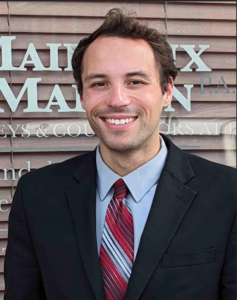As the only practicing veterans’ disability attorney north of Portland, Maine, I am intimately familiar with the particular challenges faced by veterans in our state. Maine has the fifth-highest percentage of veterans per capita, and is one of the nation’s oldest (by population) and most rural states. Given these and other factors, I find a pressing need – and call to duty – to clarify misconceptions about veterans’ disability benefits.
Veterans’ disability law is fundamentally non-partisan, a rare oasis of common ground in our political landscape. In the recent past, and particularly over the past six years, lawmakers have reformed VA disability benefits in a depolarizing and non-partisan manner. The Appeals Modernization Act of 2017 – a much-needed streamline of the benefit appeals process – was passed with unanimous support in both congressional chambers. The Blue Water Act of 2019 – which created the legal presumption that service members who served within 12 nautical miles of the Vietnam coastline were exposed to Agent Orange – was also passed with unanimous support. Finally, the PACT Act of 2022 – which liberalized access to VA health care and created more legal presumptions regarding exposure to environmental toxins, among other needed reforms – passed the Senate 86-11 and the House 256-174.
I grew up and live in Freedom, Maine. Its population is only 750 people. I practice law in nearby Belfast, which has only 7,000 people. Education about veterans’ disability benefits is almost impossible to come by. So, what are the common misconceptions I hear from my clients?
First, there is a critical distinction between VA “disability benefits” and VA “healthcare.” Disability benefits, including a retroactive lump sum payment and ongoing monthly monetary entitlements, are awarded for medical conditions that the VA deems “at least as likely as not” connected to a veteran’s active duty military service. Yet, too often, veterans conflate these benefits with the healthcare they receive from places like VA hospitals and clinics, and miss out on these separate, monthly monetary entitlements. There is no reason a veteran cannot apply for disability benefits and receive VA healthcare.
Second, the term “disability” encompasses a far broader range of conditions than commonly understood. It is not restricted to the most severe, obvious medical conditions – like a broken leg or amputated body part – but includes any medical condition which “functionally impairs” a veteran’s ability to be gainfully employed. So something as severe and “hidden” as a mental health disorder, or something as minute as a “painful scar,” can be assigned a disability rating because VA deems it to impair a veteran’s ability to earn money. Understanding this broad definition is pivotal to ensuring veterans receive benefits for all applicable service-related conditions.
Lastly, eligibility for VA benefits does not hinge on overseas deployment or combat action—a misconception that prevents many veterans from even considering themselves “veterans.” The only requirement to at least apply for disability benefits is that the veteran has some period of active duty service with a discharge that isn’t dishonorable. Those are the two threshold questions to ask – of course, a veteran has to prove that a current medical condition is related to service in some way. To illustrate by example: a veteran who served on active duty for only two weeks in basic training before being unexpectedly mustered out of service, is entitled to the same opportunity to apply for the same kind and same amount of disability benefits as the service member who deployed twice to Vietnam and spent thirty years in the Army. Is that fair? That’s not for me to say. But it is the law that Congress decided is one of the post-service benefits of signing on the dotted line.
These misconceptions are not merely trivial; they are public awareness barriers which deny veterans access to deserved benefits. It is my mission, through education and public engagement, to dismantle these barriers and make people understand a veteran’s sacrifice does not end with their service. It is a mission that calls for the concerted effort of media, institutions, and every citizen who holds our veterans in high esteem. Only then can we clear the fog of war which follows our veterans home and ensure they receive the support they have earned.
_______________________________________________________________________________________________________
 Tyler C. Hadyniak, Esq. grew up and lives in Freedom, Maine. He is an associate attorney at Mailloux and Marden, P.A., and “Of Counsel” at Jackson and MacNichol. His practice focuses on family law and veterans’ disability benefits. He spent the first nine months of his legal career traveling around the country representing veterans in Board of Veterans Appeals hearings, memorializing his experiences in his published memoir, “There and Back Again: America Through the Eyes of a Veterans Disability Attorney,” available on Amazon. He is a weekly columnist for The Republican Journal and stays civically involved in his hometown.
Tyler C. Hadyniak, Esq. grew up and lives in Freedom, Maine. He is an associate attorney at Mailloux and Marden, P.A., and “Of Counsel” at Jackson and MacNichol. His practice focuses on family law and veterans’ disability benefits. He spent the first nine months of his legal career traveling around the country representing veterans in Board of Veterans Appeals hearings, memorializing his experiences in his published memoir, “There and Back Again: America Through the Eyes of a Veterans Disability Attorney,” available on Amazon. He is a weekly columnist for The Republican Journal and stays civically involved in his hometown.






